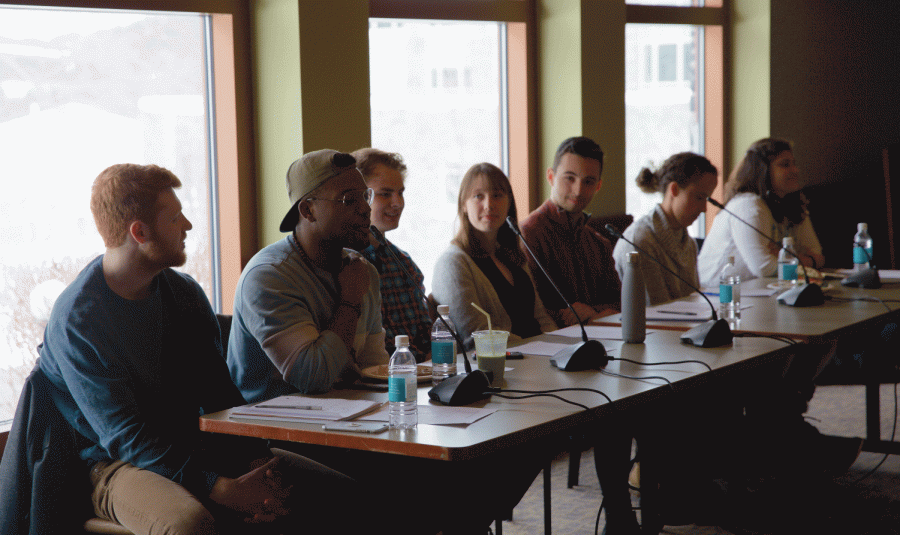Panel Discusses Belonging and Social Wellness at Colgate
A panel of seven students with diverse on-campus affiliations assembled on Thursday, April 5, to discuss questions of social wellness at Colgate. Senior Nicole Lue organized the event through Haven, Colgate’s sexual violence response center, to bring attention to the state of social life and community wellbeing at Colgate.
Opening the panel with a short statement about her own experiences, Lue reflected on a time when she considered transferring from Colgate during her sophomore year. Lue cited feelings of estrangement and social discomfort as reasons for wanting to transfer. In response to her own experiences and recent events within the community, Lue collaborated with Haven and other student leaders to begin a conversation about how the community might address common problems plaguing social life at Colgate.
The event was structured as a Q&A between the seven panelists and two moderators, Director of Counseling and Pyschological Services and Director of Sexual Violence Support Dawn LaFrance and Assistant Director of Survivor Support Service Denise Contreras. The seven panelists were selected for their diverse array of studies and on-campus interests, which ranged from Greek life to a cappella and intramural sports. The panelists were seniors A. J. Ward and Brianne Lacy, juniors Brandon Biney, J. P. McMahon and Kathleen Bynon and sophomores Grant Morro and Rupika Chakraverti.
The moderators opened the discussion with the question, “What does social wellness mean to you?” Panelists honed in on how difficult it is to define social wellness as a concept and in practice.
Bynon, Chapter President of the sorority Delta Delta Delta, commented, “The big reason we’re having this discussion is because there are a lot of different answers to what social wellness means. It’s very individual in what you feel drawn towards, but I love how there’s not one thing that’s social wellness; it depends on what you like and don’t like.”
The moderators then shifted to discuss social wellness at Colgate specifically. Biney and Chakraverti agreed that students, faculty and staff face challenges in meeting the demands of their many organizational involvements. Biney argued, “People stretch themselves thin and get themselves involved in a million organizations.”
The discussion soon moved towards Greek life at Colgate, as six of the seven panelists had been affiliated with Greek letter organizations at some point during their time at Colgate. Opinions on Greek life were split between those who chose to disaffiliate and those who remained involved.
McMahon identified the networking opportunities offered by Greek life as a primary reason that he became affiliated.
“[Greek life] has only increased my social wellness and my ability to navigate Colgate in general,” he said.
Biney disaffiliated and Ward chose not to affiliate because they did not believe the organization’s values matched their own.
Biney noted, “I think it [my decision to disaffiliate] mostly came from the ways that Greek life highlights certain values while it ignores others. I think people in Greek life generally emphasize party culture, and in fraternities it’s all about brotherhood, but not necessarily being a good person or focusing on racism and sexual assault.”
Chakraverti added an analytical perspective on Greek life.
“Individual people are great in Greek life,” she said. “It’s the way that people change when in that environment, the way that they shut down when they’re in that setting, that needs to be worked on.”
Bynon offered a different perspective with her experience leading Delta Delta Delta.
“Since joining, I’ve found that our voices have been louder in discussing sexual assault – that is huge for us,” Bynon said.
“We’re going to have these conversations, and we’re going to hold these people accountable. Being in this organization has allowed this to take form and for us to build something from that to say that sexual assault isn’t acceptable, to hold people to a higher standard.”
Conversation centered around Greek life, but it was not the panel’s only subject of concern. Lacy reflected on joining the Sophomore Residential Seminars (SRS) program.
She explained, “SRS was really the first time that I felt I belonged at Colgate. There’s a lot of pressure to join Greek life after your first year, and especially for desperate first-years.”
Lacy recommended all first-year students in the audience apply for a position in the SRS program. “I met all of my close friends through SRS.”
As the hour drew to a close, the moderators opened the panel to questions from the audience. When asked about the effects of social segregation on campus, Morro, who transferred to Colgate this year, responded, “There’s one thing I’ve noticed about this campus that’s difficult: the sheer lack of communal spaces on campus.”
He went on, “African, Latino, Asian and Native American (ALANA) is on the outskirts. Those centers need to be more central. If we’re trying to build communities that have less segregation, we need to create spaces where that can happen.”
The moderators and panel closed their discussion for the day, but conversations around social wellness at Colgate will continue as the community works to overcome these issues. Lue encouraged students considering affiliating with an on-campus organization to reach out to members of the panel if they have questions about ways to be socially well at Colgate.
Contact Luke Felty at [email protected].







